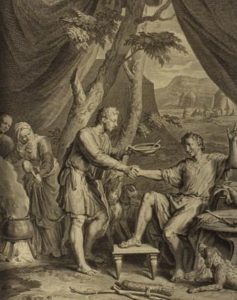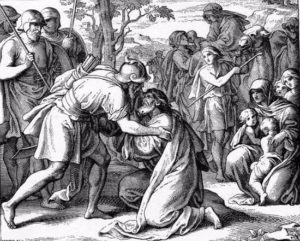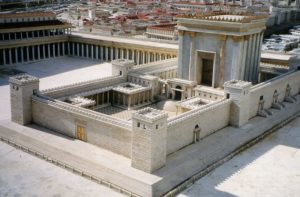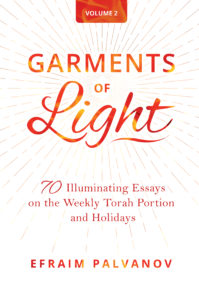This week’s parasha, Toldot, begins with a focus on Isaac, now forty years old and finally married. Commenting on this, the Zohar says some incredible things. Embedded here in the Zohar is a deeply mystical text known as Midrash HaNe’elam, “the Hidden Midrash”. It is both an integral part of the Zohar (with others sections of it peppered throughout the Zohar’s many volumes) and a distinct work with its own flavour. It, too, dates back to the 2nd century CE teachings of Rabbi Shimon bar Yochai. Midrash HaNe’elam explains that Isaac was “brought back to life”, so to speak, by his wife Rebecca. How so? Continue reading
Tag Archives: Europe
Eye-Openers from the Book of Jubilees
Parashat Behar begins with the command to observe shemitah, the Sabbatical year, and to proclaim a yovel, “Jubilee”, every 50th year after seven such cycles. The 50th year is a particularly special one, where “freedom shall be proclaimed”, slaves are freed, and all property returns to their ancestral owners. This is one of several incredible mitzvot which demonstrate the Torah’s strong emphasis on socio-economic equality and justice.
In the ancient Jewish world, the Jubilee was an important milestone for tracking the passage of time. For example, the Talmud (Arakhin 12b) calculates how long each Temple stood in terms of the number of Sabbaticals and Jubilees elapsed, and that there were exactly 17 Jubilees between Israel’s entry into the Holy Land and their exile by the Babylonians. In fact, there is an entire book, known as Jubilees, written some time in the Second Temple era which divides the early history of Israel and the world into segments of Jubilees. This intriguing text is one of the most controversial books from that era.
It is unknown who wrote Jubilees, but it itself claims to be a revelation given to Moses by the angels upon Mt. Sinai. Moses is the subject of the book, the “you” to whom the angels are speaking. It presents a comprehensive history from Creation until the given of the Torah on Mt. Sinai, organized into 50 Jubilees. The book holds that a Jubilee year, the fiftieth year, is also the first year of the next shemitah cycle. This means that a complete cycle is not 50 years, but 49 years. That’s precisely the debate in the Talmud page cited above. The Sages question whether the Jubilee year is the first year of the next shemitah or not. Rabbi Yehuda insists that it does, which is just one example of the Book of Jubilees overlapping with traditional Judaism.
Having said that, our Sages did not include Jubilees in the Tanakh. Although it reads very much like a Biblical book, it was excluded from the canon. This was not the case among Ethiopian Jews, who surprisingly did include Jubilees in their Tanakh! The same is true for the Ethiopian Orthodox Church. Many ancient Christian scholars referenced Jubilees, too, while modern scholars have shown that Jubilees was an important book for the Maccabees. The Hasmonean dynasty that followed made extensive use of it, as did the priests of the late Second Temple era. Among the Dead Sea Scrolls, Jubilees is one of the most prevalent texts, more than all other books of ‘Nakh except Psalms and Isaiah. All of this proves that the Book of Jubilees was of great significance in olden days, and greatly influenced Judaism (and Christianity). Intriguingly, some scholars have shown that Jubilees had an even greater impact on Islam, and much of the Quran was clearly inspired by it (see the work of Jan van Reeth for more).
In traditional Jewish texts, too, especially in Midrash and Kabbalah, there are numerous teachings which overlap with Jubilees. In fact, Jubilees may be the earliest known written source for some foundational points of Judaism today. For example, in chapter 7 we see the first description of God giving a set of laws to Noah. A careful count shows there are seven. The Torah does not explicitly say anything about a code of law given to Noah, but Jewish tradition of course speaks of seven “Noahide” laws.
In Jubilees, these laws are: 1) be just and righteous, 2) dress modestly, 3) bless the Creator, 4) honour parents, 5) love your fellow, 6) abstain from sexual sins, plus 7) the prohibition of eating the limb of a live animal which was relayed a bit earlier in the text. In the Talmud (Sanhedrin 56a-b), the Noahide laws are: 1) establish courts of law, 2) bless the Creator, 3) do not worship idols, 4) abstain from sexual sins, 5) do not murder, 6) do not steal, and 7) do not eat the limb of a live animal.
The first law in Jubilees and the Talmud is one and the same: being just implies having a justice system, ie. establishing courts of law. The second in the Talmud is phrased as “blessing Hashem”, just like the third in Jubilees, but is taken to mean not to curse Hashem, since we don’t expect gentiles to know Hebrew blessings. In any case, it is the same law. Not to engage in sexual sins and not to consume the limb of a live animal are the same. All in all, four of the seven are identical, and there are some parallels between the other three.
Another idea that finds its earliest expression in Jubilees is the concept of a messianic “millennium” (23:18-29). After a series of great travails, the world will enter an idyllic age that lasts one thousand years, with no evil and Satan destroyed. This is similar to descriptions in the Talmud (see, for instance, Sanhedrin 97a).
A final example: Jubilees states that God created seven things on the First Day: Heaven and Earth, water, spirits, darkness and light, and the abyss (tehom, as in Genesis 1:2). This is essentially identical to the Midrash (Pirkei d’Rabbi Eliezer, ch. 3), which says eight things were created on the First Day: Heaven and Earth, water, the Divine Spirit, darkness and light, and tohu v’vohu (also in Genesis 1:2), which can be seen as two parts of the tehom.
The Book of Jubilees presents many more fascinating details. Although not officially accepted in the Jewish canon, we see that it does contain a great deal of accurate information that is also in accepted Jewish texts. This makes it a potentially very useful tool to shed light on some of the big mysteries in Judaism. What follows is a list of some of the most intriguing and perhaps controversial teachings from the Book of Jubilees.
The above is an excerpt from Garments of Light, Volume Two. To continue reading, get the book here!
How Esau Became Rome
In this week’s parasha, Toldot, we are introduced to the twin sons of Isaac: Jacob and Esau. The Torah tells us that the boys grew up and Esau became a “man of the field” while Jacob was “an innocent man sitting in tents” (Genesis 25:27). In rabbinic literature, Esau takes on a very negative aura. Although the Torah doesn’t really portray him as such a bad guy, extra-Biblical texts depict him as the worst kind of person.

A 1728 Illustration of Esau selling his birthright.
Take, for instance, the first interaction between Jacob and Esau that the Torah relates. Esau comes back from the field extremely tired. At that moment, Jacob is cooking a stew. Esau asks his brother for some food, and Jacob demands in exchange that Esau give up his birthright (ie. his status as firstborn, and the privileges that come with that). Esau agrees because “behold, I am going to die” (Genesis 25:32). The plain text of the Torah makes it seem like Jacob took advantage of Esau’s near-fatal weariness and tricked him into selling his birthright. This is later confirmed when Esau says that Jacob had deceived him (Genesis 27:36), implying that Esau never really wished to rid of it.
Yet, the Torah commentaries appear to flip the story upside down. When Esau comes back from the field exhausted, it isn’t because he just returned from a difficult hunt, but rather because, as Rashi comments, he had just come back from committing murder! When Esau says “I am going to die”, it isn’t because he was on the verge of death at that moment, but because he didn’t care about the birthright at all, choosing to live by the old adage of “eat, drink, and be merry, for tomorrow we die”. This is a very different perspective on the same narrative.
Another example is when, many years later, Jacob returns to the Holy Land and Esau comes to meet him. Jacob assumes Esau wants to kill him, and prepares for battle. Instead, Esau genuinely seems to have missed his brother, and runs towards him, “embracing him, falling upon his neck, and kissing him” (Genesis 33:4). Again, some of the commentaries turn these words upside down, saying that Esau didn’t really lovingly kiss his brother, but actually bit him! Rashi’s commentary on this verse cites both versions. He concludes by citing Rabbi Shimon bar Yochai in stating that although Esau, as a rule, hates Jacob, at that moment he really did love his brother.
So, how bad was Esau really?
Seeing the Good in Esau
Occasionally, we read about Esau’s good qualities. The Midrash (Devarim Rabbah 1:15) famously states that no one honoured their parents better than Esau did. This is clear from a simple reading of the Torah, too, where Esau is always standing by to fulfil his parents’ wishes. For instance, as soon as he learns that his parents are unhappy with his choice of wives, he immediately goes off to marry someone they might approve of (Genesis 28:8-9).
We should be asking why his parents didn’t simply tell him from the start that his original wives were no good? Why did they allow him to marry them in the first place? If Esau really was the person who most honours his parents, he would have surely listened to them! We may learn from this that Esau’s parents didn’t put too much effort into him. It’s almost like Rebecca gave up on her son from the moment she heard the prophecy about the twins in her belly. The Torah says as much when it states, right after the birth of the twins, that “Isaac loved Esau because his game-meat was in his mouth, but Rebecca loved Jacob.” (Genesis 25:28) Rebecca showed affection to Jacob alone, while Isaac’s love for Esau was apparently conditional. Of course, children always feel their parents’ inner sentiments, and there is no doubt Esau felt his parents’ lack of concern for him. Is it any wonder he tried so hard to please them?
From this perspective, one starts to feel a great deal of pity for Esau. How can anyone read Esau’s heartfelt words after being tricked out of his blessing and not be filled with empathy?:
When Esau heard his father’s words, he cried out a great and bitter cry, and he said to his father, “Bless me, too, O my father! …Do you not have a blessing left for me?” (Genesis 27:34-36)
Esau was handed a bad deal right from the start. He was born different, not just in appearance, but with a serious life challenge. He was gifted (or cursed) with a particularly strong yetzer hara, from birth. His fate was already foretold, and his parents believed it. They invested little into him. And it seems all he ever wanted was to make them proud.
Incidentally, this is one of the major problems with fortune-telling, and why the Torah is so adamant about not consulting any kind of psychic. The psychic’s words, even if entirely wrong, will shape the person’s views. It is very much like the Talmud’s statement (Berakhot 55b) that a dream is fulfilled according to how it is interpreted. A person believes the interpreter, and inadvertently brings about that interpretation upon themselves. It’s a self-fulfilling prophecy.
Who knows what might have happened if Rebecca never bothered to consult a prophet about her pregnancy? After all, Jewish tradition is clear on the fact that negative prophecies do not have to come true. God relays such a prophecy in order to inspire people to change, and thus avert the negative decree. Such was precisely the case with Jonah and his prophecy regarding Nineveh. The people heard the warning, repented, and the prophecy was averted.
Perhaps this is what Isaac and Rebecca should have done. Instead of giving up on Esau, they should have worked extra hard to guide him in the right direction. (Isaac indirectly did the opposite, motivating his son’s hunting since he loved the “game-meat in his mouth”.) The Sages affirm that Esau was not a lost case, and state that had Jacob allowed his daughter Dinah to marry Esau, she would have reformed him (see, for example, Beresheet Rabbah 76:9).
At the end, Jacob returns to the Holy Land and, instead of the war with Esau that he was expecting, his brother welcomes him back with open arms. He weeps, and genuinely misses him. Esau has forgiven his brother, yet again, and buries the past. He hopes to live with his brother in peace henceforth, and invites him to live together in Seir. Esau offers to safely escort Jacob and his family. Jacob rejects the offer, and tells Esau to go along and he will join him later (Genesis 33:14). This never happens. Jacob has no intention to live with Esau, and as soon as his brother leaves, Jacob a completely different course. Esau is tricked one last time.
We only hear about Esau once more in the Torah. When Isaac dies, Esau is there to give his father a proper burial (Genesis 35:29). In fact, the Book of Jubilees, which doesn’t portray Esau too kindly either, nonetheless suggests that Esau had repented at the end of his life. There we read that it was his sons that turned evil, and even coerced him into wrongdoing (37:1-5). In Jubilees, Esau tells his parents that he has no interest in killing Jacob, and loves his brother wholeheartedly, more than anyone else (35:22). He admits that Jacob is the one that deserves the birthright, and a double portion as the assumed firstborn (36:12).
The Torah never tells us what ends up happening to Esau. The Midrash states that he was still there when Jacob’s sons came to bury their father in the Cave of the Patriarchs. Esau tried to stop them, at which point Jacob’s deaf grandson Hushim decapitated him. (A slightly different version is found in the Talmud as well, Sotah 13a.) Esau’s head rolled down into the Cave of the Patriarchs, while the rest of his body was buried elsewhere. Perhaps what this is meant to teach us is that while Esau’s body was indeed mired in sin, his head was completely sound, and he certainly had the potential to be a righteous man—maybe even one of the forefathers, hence his partial burial in the Cave of the Patriarchs.
At the end of the day, Esau is not so much a villain as he is a tragically failed hero.
Why Did Esau Become so Evil?

Esau meets Jacob, by Charles Foster (1897)
As we’ve seen, the Torah itself doesn’t portray Esau as such a bad person. Conversely, one of the 613 mitzvot is “not to despise an Edomite, for he is your brother.” (Deuteronomy 23:8) The Torah reminds us that the children of Israel and the children of Esau (known as Edomites) are siblings, and should treat each other as such.
Nearly a millennium later, the prophet Malachi—generally considered the last prophet and, according to one tradition, identified with Ezra the Scribe—says (Malachi 1:2-3):
“I have loved you,” says Hashem, “Yet you say: ‘How have You loved us?’ Was not Esau a brother to Jacob?” says Hashem, “yet I loved Jacob, but Esau I hated…”
The text goes on to differentiate between Israel and Edom, stating that while Israel will be restored, Edom will be permanently extinguished. We have seen this prophecy fulfilled in history; Israel is still here, of course, while Edom has long disappeared from the historical record. Jacob’s descendants continue to thrive, while Esau’s are long gone.
By the times of the Talmud, there were no real Edomites left, so the Sages began to associate Edom with a new entity: the Roman Empire. The Sages certainly didn’t believe that the Romans were the direct genetic descendants of Esau, but rather that they were their spiritual heirs. Why did the Sages make this connection?
I believe the answers lies with King Herod the Great.
Recall that approximately two thousand years ago Herod ruled as the Roman-approved puppet king of Judea. He was a tremendous tyrant, and is vilified in both Jewish and Christian tradition. The Talmud (Bava Batra 3b-4a) relates how Herod slaughtered all the rabbis in his day, leaving only Bava ben Buta, whom he had blinded. Later, Herod had an exchange with Bava and realized how wise the rabbis were:
Herod then said: “I am Herod. Had I known that the Rabbis were so circumspect, I should not have killed them. Now tell me what amends I can make.”
Bava ben Buta replied: “As you have extinguished the light of the world, [for so the Torah Sages are called] as it is written, ‘For the commandment is a light and the Torah a lamp’ (Proverbs 6:23), go now and attend to the light of the world [which is the Temple] as it is written, ‘And all the nations become enlightened by it.’” (Isaiah 2:2)

A model of Herod’s version of the Second Temple in Jerusalem
Herod did just that, and renovated the Temple to be the most beautiful building of all time, according to the Talmud. It wouldn’t last long, as that same Temple would be destroyed by his Roman overlords within about a century.
What many forget is that Herod was not a native Jew, but an Idumean. And “Idumea” was simply the Roman name for Edom. Herod was a real, red-blooded Edomite. (Though it should be noted that the Idumeans had loosely, or perhaps forcibly, converted to Judaism in the time of the Hasmoneans.) Herod took over the Jewish monarchy, and began the horrible persecutions that the Roman Empire—of which he was a part—was all too happy to continue. It seems quite likely, therefore, that the association between Edom and Rome began at that point. The people resented that Roman-Edomite tyrant Herod that persecuted them so harshly.
Henceforth, it was easy for the Sages to spill their wrath upon Edom, and their progenitor Esau. Esau became a symbol of the Roman oppressor. “Esau” and “Edom” were code words, used for speaking disparagingly about Rome to avoid alarming the authorities. Indeed, when the Sages speak about the evils of Esau, they are often really referring to the evils of the Roman Empire. It is therefore not surprising that Esau becomes possibly the most reviled figure in the Torah—as the Romans were unquestionably the most reviled entity in Talmudic times.
The above is an excerpt from Garments of Light, Volume Two. To continue reading, get the book here!

